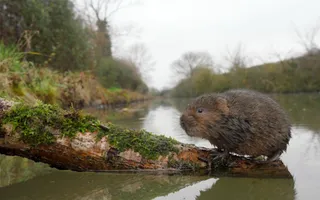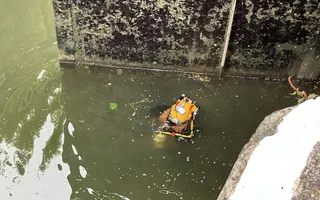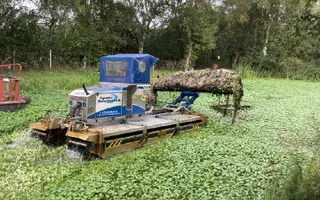A chemical reaction in Walsall
In August, a major incident was declared in Pleck, near Walsall, after toxic chemicals spilled into the canal. In the aftermath, we launched a fundraiser to help the recovery of local wildlife.
The charity making life better by water
Making life better by water
Hot off the press, it’s our latest Regional Round Up, bringing you news and views from a canal near you. This time, we’re tackling toxic spills and invasive plants, and taking a deep dive into lock repair.
In August, a major incident was declared in Pleck, near Walsall, after toxic chemicals spilled into the canal. In the aftermath, we launched a fundraiser to help the recovery of local wildlife.
Following the spillage, we were among the first on the scene, working around the clock as part of a multi-agency response team, to contain the spill and prevent it from spreading further along the canal. A 12-mile stretch of Walsall Canal was closed as a precaution, while the Environment Agency ran some tests. To our dismay, sodium cyanide was discovered in the water, a particularly nasty pollutant, with serious implications for public health and local wildlife.
After further testing, the restriction zone was reduced to just half a mile, but the impact on aquatic life was still considerable. Dozens of fish were killed almost immediately, and the true extent of the damage is still unknown, with local populations of water voles, otters, and waterbirds all at serious risk.
To help with the cleanup and support the recovery of wildlife, we launched a fundraising appeal. The response was overwhelming. Over the coming weeks and months, donations flooded in. Thanks to your generosity, we’ve been able to begin the painstaking process of repairing this delicate ecosystem.
Divers took the plunge on the Kennet & Avon Canal this summer, as we carried out vital repairs to Weston Lock, near the historic city of Bath.
Weston Lock is one of more than a hundred locks spanning the Kennet & Avon Canal between Bristol and the River Thames at Reading. Built nearly 300 years ago, like many of our ageing structures, the Grade II listed lock requires regular maintenance. In August, we had to make repairs to one of the lock’s ‘paddles’ – the trap door that boaters use to empty the lock of water.
Usually, this would require us to install temporary dams and drain the lock, a drawn-out process often resulting in lengthy closures and delays for boaters. Instead, we sent down specialist divers to remove the paddle from the lock gate, allowing our maintenance team to make the necessary repairs on the bank. When they were done, the divers simply fixed the restored paddle back in place. While they were below the surface, the dive team were also able to conduct a thorough inspection, removing weeds, timber and other debris from around the lock gates.
“Using divers in this way is cost-effective and minimises disruption,” says contract manager, Rob Labus. “It’s vital we carry out repairs and inspections like this so that the navigation can remain open for boaters and for the benefit of the local community.”
This summer, volunteers, colleagues and contractors across London and the South East rolled up their sleeves to help us rid our canals of invasive weeds.
Interlopers, such as floating pennywort, azolla and duckweed are particularly prevalent on the Regent’s Canal, Grand Union Canal, and River Lee Navigation, and our annual programme to clear the unwanted vegetation is getting more costly every year.
The proliferation of weeds on our canals during the summer months is nothing new, but our rapidly changing climate is exacerbating the problem. Weeds thrive in high temperatures, and heavy rainfall from fierce summer storms washes plenty of nutrients into the water. Left unchecked, invasive weeds can quickly grow out of control, choking our canals, starving other plants of oxygen, and posing a risk to wildlife.
In London and the South East, our teams worked tirelessly to redress the balance, deploying a fleet of specialist boats to scoop weeds off the top of the water. But it’s the tip of the iceberg. Last year alone, across England and Wales, we had to invest upwards of £1 million to fund the removal of more than 2,500 tonnes of invasive weed. With your continued support, we hope to keep harmful plants at bay, protect our precious wildlife, and keep our canals open and accessible for all.
Last Edited: 1 November 2024

Sign up to our newsletter and discover how we protect canals and help nature thrive



